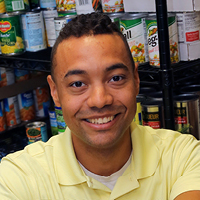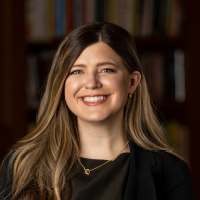The Capstone project culminates students’ studies with an in-depth, on-site project focused on understanding and transforming complex systems.
Many students combine their Capstone with an employment opportunity, and others see their projects lead directly to full-time positions.
For organizations who are interested in partnering with the Clinton School on Capstone project, please see the Capstone Partnerships page.
Brandon Mathews | Arkansas Foodbank
Combatting food insecurity on college campuses
Working with Arkansas Foodbank, Brandon Mathews developed a plan for establishing and operating food pantries on college and university campuses in Arkansas. His work resulted in the publishing of a campus food pantry toolkit, covering topics like fundraising, marketing, operations, and more. Mathews oversaw the emergence of multiple food pantries through joint efforts of the Arkansas Foodbank and cooperating campuses, which have since served thousands of food-insecure students.
Mathews connected his Capstone work with the College and University Food Bank Alliance (CUFBA), beginning a partnership that continues to this day. When Mathews joined CUFBA in 2015, there were roughly 175 CUFBA food banks at colleges and universities across the country. Today, there are more than 700.

Brandon Mathews (’15)
“I worked as an undergraduate at the University of Arkansas Full Circle Food Pantry, so I got to see the day-to-day operations, I got to see the faces of my classmates and also the staff at the school that struggled with food insecurity. But I also was a client myself. I knew that I wanted to do something else in that space, and when I came to the Clinton School I had the opportunity to tailor my Capstone project in that way. The leadership and mentorship I received here from the staff was probably, by far, the most impactful thing that happened to me and for me.”
Gillian Gullett | Downtown Little Rock Partnership
Impacting the future of Downtown Little Rock
Gillian Gullett, native of Little Rock, partnered with the Downtown Little Rock Partnership on her final Capstone project. Gullett’s work focused on the city’s nearly 20,000 downtown parking spaces – many of which go unused every day.
Underutilized surface lots separate businesses and corridors from each other, leaving downtowns less walkable and connected.
Gullett, whose research included studying cities of similar size and how they have shaped their downtowns, provided recommendations to the city on how repurposing these parking dead zones can bring about growth and development in downtown Little Rock.

Gillian Gullett (’23)
“Over the past school year, I spent 280+ hours working with Gabe Holmstrom and the Downtown Little Rock Partnership to improve our city’s parking policies in a way that optimizes underutilized space and fosters growth and development in Downtown Little Rock. I was proud and excited to share my policy recommendations with their Executive Board and Mayor Frank Scott, Jr. I’m confident these recommendations will find a place in Little Rock’s upcoming master plan and make our downtown more walkable, vibrant, and connected.”
Sylvia Tran | Senhoa Foundation
Rehabilitating and reintegrating human trafficking survivors
Sylvia Tran spent five months working in Cambodia with Lotus Kids’ Club, an early-intervention program for anti-human trafficking funded by the Senhoa Foundation and the Cambodian Center for the Protection of Children’s Rights.
Tran provided evidence-based guidance for improving LKC to ensure its sustainability and positive impact. She conducted research to identify improvement areas, provided feasible recommendations, and guided the staff on how to carry out the recommendations.
Upon graduation, Tran returned to Cambodia as Country Director for the Senhoa Foundation, providing continued support to its programs to assure long-lasting practices that address the prevention, rehabilitation, and reintegration of survivors of human trafficking.

Sylvia Tran (’15)
“It was such an honor to have the opportunity to provide tangible, impactful support for an organization I longed admired. The Clinton School helped prepare me for cross-cultural field work and the work itself taught me things you could never learn in a classroom. This was such a meaningful period of my life where I experienced the most growth personally and professionally. I am forever grateful for that opportunity and how it’s shaped me as a person ever since.”